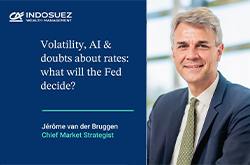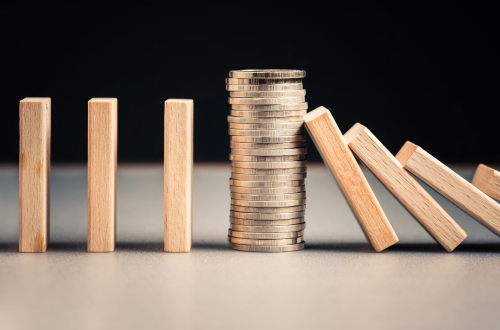When the tide goes out...

Monthly House View - April 2023 - Download here
Only when the tide goes out do you discover who’s been swimming naked”. In keeping with Warren Buffet’s saying, the sea of low interest rates and easy money has finally receded, exposing the weakest players. This was expected, which is why the financial world has been scrutinising the market for several months to detect potential weak links.
It is clear that while Credit Suisse had been identified, Silicon Valley Bank (SVB) was far from it. Indeed, until 10 March, when it defaulted, SVB was highly rated (investment grade) by S&P and Moody’s. The company also had a good rating on the ESG dimension (Environmental, Social and Governance criteria). The MSCI rating agency had given it an “A”, which meant that some “green” mutual funds in the market had bought its shares. Finally, until three months ago, the consensus among financial analysts (on the sell side) was to buy or hold the company’s positions.
In the end, it was the governance aspect that caused SVB’s default; a negative scissor effect, due to the violent rise in interest rates, between massive withdrawals (linked to a concentration of clients in the start-up sphere) and a negative market effect on the cash invested in US government bonds. In addition to this mismanagement between the bank’s assets and liabilities, the US Government bears its share of responsibility through the relaxation of banking regulations in 2018 under President Donald Trump.
In addition to the default of two US banks already identified as weak links, the crisis of confidence caused by the SVB default has put many regional banks in difficulty, including the Californian investment, asset management and services bank, First Republic Bank. What is particularly striking in this story is the solidarity that was formed around these troubled banks.
- Client solidarity for SVB; more than a hundred capital investment companies immediately expressed their support for SVB. And this is probably linked to the ESG dimension of many of them, such as the venture capital company General Catalyst, the leader of this action, which integrates strong societal values in its investments.
- Solidarity of the big banks for First Republic Bank; indeed, the bank is now escaping bankruptcy thanks to the support of its competitors. 11 major US banks have pledged a total of USD 30 billion in deposits to First Republic. This action was welcomed by the US authorities.
These initiatives are remarkable and mean that even if the sea recedes, it is potentially clearer. It is also interesting to note that in the SVB case, while a buyer is the first option chosen and it is highly likely that it will be a traditional bank, there is also the possibility that it will be a player in the new economy, like Elon Musk, who says he is open to the idea of Twitter taking a position.
What to expect next? The shockwave caused by the SVB default has spread outside the US, causing the UBS-Credit Suisse mega-merger in Europe. Nevertheless, we remain confident that this banking crisis, which is above all a crisis of confidence, will be resolved. The central banks that have injected liquidity on an ad hoc basis to deal with this crisis will probably change their restrictive policy (particularly with regard to reducing liquidity in the market), without losing sight of their original mandate: inflation.
Rising rates are therefore an opportunity to identify the weakest players. This episode is the first and there will probably be other specific events in the financial sector, but also potentially in other sectors where companies are sensitive to rising rates.
In this more volatile environment, it is necessary to turn these movements into investment opportunities and to discriminate more than ever in selecting stocks.
Monthly House View, 23/03/2023 release - Excerpt of the Editorial
April 03, 2023




